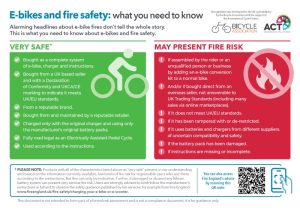ACT and Bicycle Association issue joint eBike fire safety response
In response to a barrage of, often misguided, mainstream media coverage about the risk of eBike fires, industry bodies the Association of Cycle Traders (ACT) and the Bicycle Association have “issued a joint response to the initiative of the Electrical Safety First (ESF) charity on eBike fire safety – using the opportunity to launch two new guidance notes for the cycle industry.“
Shared via the ACT and BA websites, the full announcement reads:
The ESF proposal is for legislation which would require immediate mandatory third-party approval of eBikes and battery packs, among other aspects.
 Jonathan Harrison from the Association of Cycle Traders said: “There is a perception that has been allowed to develop that eBikes are dangerous and it is not only inherently untrue but also has the potential to do great damage to the sector. There is clearly an issue around eScooter and eBike fires that needs to be addressed and, together with our colleagues at the Bicycle Association, we are keen for this situation to be addressed as swiftly as possible.”
Jonathan Harrison from the Association of Cycle Traders said: “There is a perception that has been allowed to develop that eBikes are dangerous and it is not only inherently untrue but also has the potential to do great damage to the sector. There is clearly an issue around eScooter and eBike fires that needs to be addressed and, together with our colleagues at the Bicycle Association, we are keen for this situation to be addressed as swiftly as possible.”
However, the two Associations believe that, whilst sharing Electrical Safety First’s urgent focus on public safety, the current draft bill misses the mark in some key respects.
- First, while introducing mandatory third-party testing could be part of the solution, it must run alongside much stricter enforcement of product safety on products supplied to UK consumers direct from overseas sellers, often via online marketplaces. This has been identified by the Fire and Rescue services as a key area of concern for these lithium fires. It is notable that in New York City, where third party testing has been made mandatory, these mandatory testing measures reportedly had little effect on fire incidents – because most of the problematic products were sourced online and not from local retailers. So any regulatory action to boost eBike safety must primarily address these high-risk imports.
- Fire and rescue services have also identified the app-based food delivery sector as a key area of concern due to the widespread use of eBikes either created via kits (often sourced from overseas via online marketplaces) or by modifying existing eBikes, both high risk factors for fire safety. We believe any Bill aiming to meaningfully address fire risk must impose responsibility (and liability) on food delivery app operators to ensure that the equipment used by riders is safe.
Together with the BA, the ACT would be happy to work with ESF on amendments to the proposed Bill to address these aspects, and to propose more practical arrangements for the mandatory approvals.
Most responsible suppliers in the industry would have no problem at all passing this mandatory approval process, because they have evidence of extensive product safety testing already in place. But the ESF Bill proposes no transition period to build approval capacity, and as written, would decimate the UK industry by imposing a sudden months-long halt in sales while even responsible suppliers waited for approvals to be granted.
Finally, while again we welcome the public awareness around eBike fire safety that the ESF proposal is generating, the BA notes that the Government product safety regulator, the Office for Product Safety and Standards, is also working at pace on this issue to develop official, evidence-based proposals for regulatory actions. The BA is pleased, for the responsible eBike industry, to be contributing positively to this work which will, we hope, address the root causes of this battery fire issue with a comprehensive package of measures which are swiftly implemented.
The ESF proposal coincides with a joint BA and ACT industry initiative to boost industry and consumer awareness of the difference between e-bikes which are generally very safe, and those which may be at higher risk of fire. The two cycle industry trade bodies in the UK have issued two guidance sheets for the industry, aiming to counter the often-misleading media headlines.
- The first guidance note summarises statements from fire services and industry experts to clarify the distinction between eBikes from the reputable industry (which are generally very safe) as opposed to eBikes, conversion kits, batteries and chargers which may pose significant fire hazard if certain risk factors are present, for example being sourced from overseas via online marketplaces.
- The second clarifies exactly what is road legal as an eBike – and makes clear the actual legal status of vehicles which are often incorrectly reported as eBikes, but which are in fact unregistered motorbikes.
Download the documents at cycleassociation.uk/e-bikes




